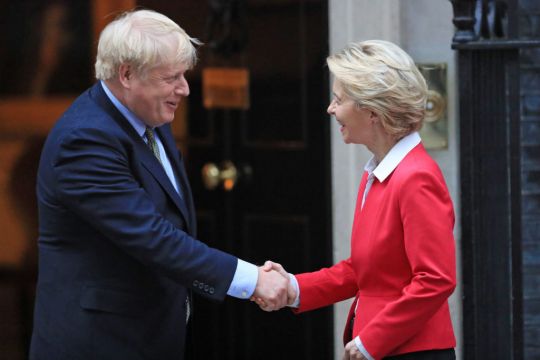The European Union will have to give ground if there is to be any hope of a breakthrough in crunch talks between the British prime minister and Brussels’ top official, Michael Gove has said.
The senior UK Cabinet minister said Wednesday’s meeting between Boris Johnson and European Commission president Ursula von der Leyen offers the chance to “thrash out” the issues which still divide the two sides.
The pair’s dinner in Brussels comes as time is running out to reach a trade deal before the current transitional arrangements expire at the end of the month.
There have been pessimistic briefings from both sides ahead of the face-to-face talks, with UK sources acknowledging “an agreement may not be possible” and the EU’s negotiator, Michel Barnier, warning the bloc’s foreign ministers that a no-deal scenario is more likely than an agreement.
Asked about Mr Barnier’s gloomy assessment, Mr Gove said: “No, I don’t think it is right to say that yet.
“I think that tonight there is an opportunity for the Prime Minister and Ursula von der Leyen, and they have a good relationship, to thrash out a potential way through.”
Veto
He told BBC Radio 4’s Today programme that Mrs von der Leyen “will want to ensure that all EU member states recognise that a deal is in everyone’s interest and that will require a degree of movement for some on the EU side”.
That comment could be seen as a reference to French warnings that President Emmanuel Macron could veto a deal, with Paris especially concerned about the issue of fishing rights – one of the main obstacles to an agreement.
Mr Gove told the BBC that he hopes Mr Johnson “will be able to lay out, over the course of dinner, where movement is required” from the EU side.
“The conversation between the prime minister and the president tonight, I hope, will create further political momentum, which will make sure that we do reach an agreement.”
Mr Gove led for the UK in talks with the EU on implementing the Brexit divorce deal which produced a breakthrough on Tuesday.
I don’t think there is a border in the Irish Sea
Advertisement
The UK Government dropped controversial plans which would have allowed ministers to break international law as a result of the progress on the issues around Northern Ireland – something which could help improve relations with the EU and boost the chances of a trade deal.
Mr Gove denied that the agreement meant Mr Johnson has conceded to a trade border down the Irish Sea between Northern Ireland and Great Britain.
“I don’t think there is a border in the Irish Sea,” he said.
But Mr Gove will face questions from MPs about the details of the deal, which will see EU officials based in Northern Ireland – something which will cause disquiet among Brexiteers although UK sources said the agreement fell short of the “mini-embassy” that Brussels had wanted.

The protracted negotiations on a UK-EU trade deal have faltered on the issues of fishing rights, the “level playing field” measures aimed at preventing the UK undercutting the EU on standards and state subsidies, and the way that any deal would be governed.
Mr Johnson has insisted the UK will “prosper mightily” without a deal, but economic experts have warned of serious damage.







